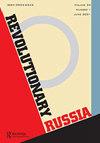The Last White Victory: Aleksandr Guchkov and the Conradi-Polunin Process of 1923
IF 0.2
2区 历史学
Q2 HISTORY
引用次数: 1
Abstract
Aleksandr Guchkov is a well-known figure of Russian politics from the first two decades of the 20th century. However, his activities in exile have not been thoroughly studied. Among the myriad of engagements against the Soviet regime in the 1920s–1930s that Guchkov planned, the Conradi-Polunin Process (May–November 1923) in Lausanne stands out. Through previously unpublished documents and other sources, this article analyses two developments. First, the crucial role that Guchkov played in the absolution of both men, who conspired and killed Soviet diplomat Vatslav Vorovsky, as the main compiler of evidence against the prosecution, turning the trial into a denunciation of communism. Second, the way in which Guchkov’s efforts in the Process engaged with the creation of Théodore Aubert’s Entente Internationale Anticommuniste (1924–1950), the most ambitious anticommunist organization within the transnational Right in the interwar period.最后的白色胜利:亚历山大·古奇科夫与1923年的康拉迪·波鲁宁进程
亚历山大·古奇科夫是20世纪前20年俄罗斯政坛的知名人物。然而,他的流亡活动并没有得到彻底的研究。在古奇科夫计划的20世纪20年代至30年代反对苏联政权的无数行动中,洛桑的Conradi Polunin进程(1923年5月至11月)脱颖而出。通过以前未发表的文献和其他来源,本文分析了两个发展。首先,古奇科夫在赦免两人方面发挥了关键作用,这两人密谋并杀害了苏联外交官瓦茨拉夫·沃罗夫斯基,他是反对起诉的主要证据汇编者,将审判变成了对共产主义的谴责。其次,古奇科夫在这一进程中的努力与特奥多尔·奥伯特的《国际反共产主义协约》(1924–1950)的创建有关,这是两次世界大战期间跨国右翼中最雄心勃勃的反共产主义组织。
本文章由计算机程序翻译,如有差异,请以英文原文为准。
求助全文
约1分钟内获得全文
求助全文

 求助内容:
求助内容: 应助结果提醒方式:
应助结果提醒方式:


